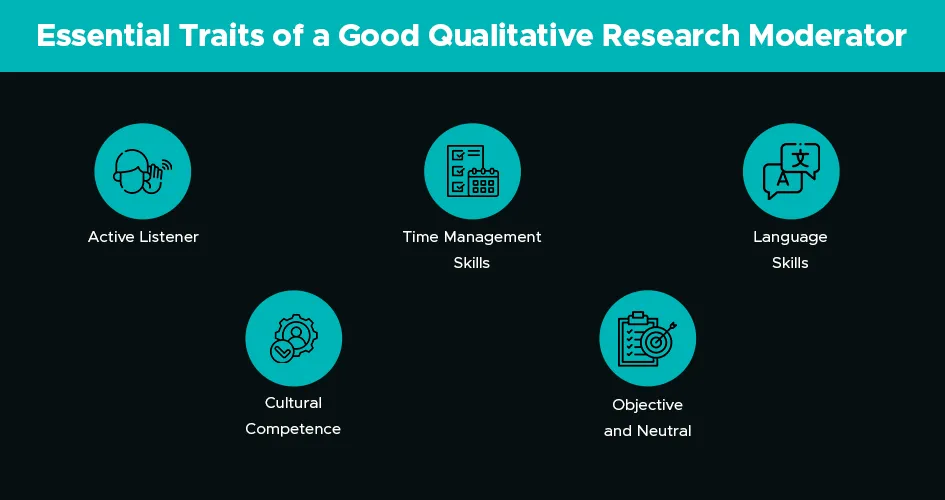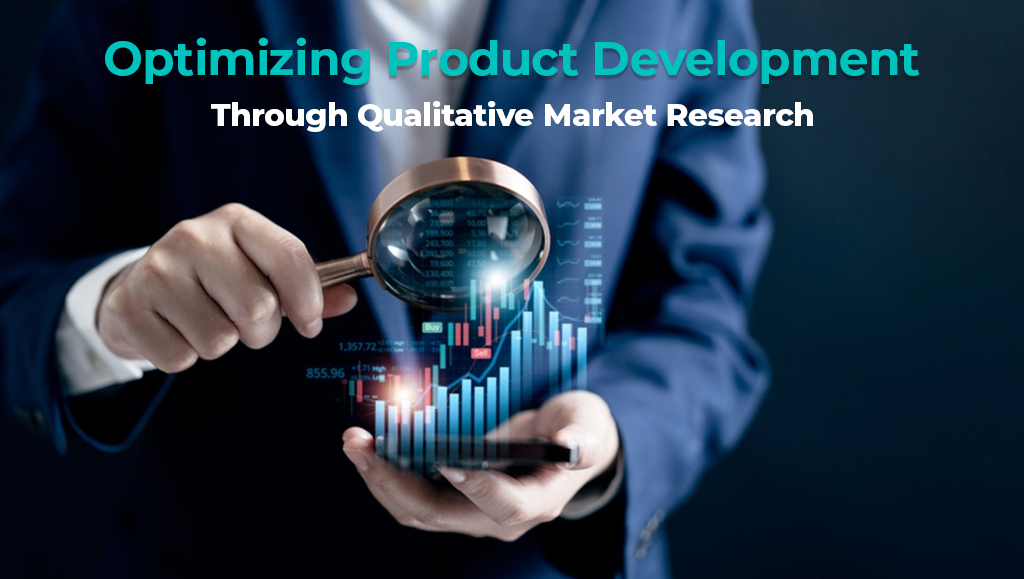
A qualitative research moderator initiates discussions, ensures that all participants contribute, and collects valuable insights that fulfill the research objectives. The effectiveness of a qualitative research study, especially in sectors like e-commerce, where consumer behavior is complex and rapidly changing, depends on the moderator’s ability to guide conversations and generate meaningful responses. With a skilled moderator, discussions can become focused, leading to complete and relevant data. A good moderator ensures that the conversation remains on track, participants feel comfortable sharing their thoughts, and the data collected is rich and actionable. Let’s understand the essential traits of a good qualitative research moderator.

Active Listener
A good qualitative research moderator is an active listener. This means they are fully engaged in what participants are saying and can pick up clues, such as tone of voice or body language, that might indicate deeper insights. Active listening involves:
- Paying Attention: Focusing on the speaker without distractions, ensuring that participants feel heard and valued.
- Reflecting and Clarifying: Summarizing what participants have said and asking follow-up questions to clarify points and deeper understanding of their responses.
- Encouraging Participation: Creating an environment where all participants feel comfortable and encouraged to share their views.
Empathic and Emotionally Intelligent
Empathy and emotional intelligence are important factors for a qualitative research moderator. They need to understand and relate to the emotions and experiences of participants, which helps in building trust and rapport. This involves:
- Understanding Emotions: Recognizing and understanding the emotions behind participants’ words, which can provide deeper insights into their motivations and behaviors.
- Building Trust: Creating a safe space where participants feel comfortable sharing their honest opinions and experiences.
- Managing Group Dynamics: Being aware of group dynamics and addressing any conflicts or discomforts that may arise during the discussion.
Flexible and Adaptable
Qualitative research can be unpredictable, with discussions taking unexpected turns. A good moderator needs to be flexible and adaptable, capable of steering conversations back on track without wasting valuable insights. This includes:
- Adjusting the Approach: Being prepared to modify the discussion guide or approach based on the flow of the conversation and the needs of the participants.
- Handling Unexpected Situations: Dealing calmly and effectively with unexpected issues, such as technical difficulties or difficult participants.
- Encouraging Spontaneity: Allowing for spontaneous discussion that can reveal unanticipated insights, while still guiding the conversation to meet research objectives.
Time Management Skills
Effective time management is essential for a qualitative research moderator. They need to ensure that the discussion covers all necessary topics within the allotted time while allowing enough time for in-depth exploration of major issues. This involves:
- Planning and Prioritizing: Setting clear objectives for the discussion and prioritizing topics based on their importance to the research goals.
- Keeping the Discussion on Track: Guiding participants to stay focused on the relevant topics and preventing the conversation from going out of the track.
- Balancing Depth and Breadth: Ensuring that the discussion is thorough enough to gather detailed insights, but broad enough to cover all necessary areas.
Language Skills
Effective communication is important for successful qualitative market research in India. A good moderator must have strong language skills to articulate questions clearly, get deeper responses, and facilitate meaningful discussions. This includes:
- Clarity and Precision: Using clear and precise language to ensure that participants understand the questions and prompts.
- Adapting Language: Adjusting the language used based on the participants’ background and the context of the discussion.
- Facilitating Understanding: Using language that encourages open dialogue and helps participants feel comfortable sharing their thoughts.
Cultural Competence
Cultural competence is important for a qualitative research moderator, especially in diverse markets like India. Understanding and respecting cultural differences helps in building rapport with participants and gathering authentic insights. This involves:
- Understanding Cultural Contexts: Being aware of cultural norms and values that may influence participants’ responses and behaviors.
- Respecting Diversity: Showing respect for participants’ cultural backgrounds and ensuring that all voices are heard and valued.
- Avoiding Bias: Being mindful of personal biases and ensuring that they do not affect the moderation process or interpretation of data.
Objective and Neutral
Maintaining objectivity and neutrality is essential for a qualitative research moderator. They must avoid influencing participants’ responses and ensure that the data collected is unbiased and reliable. This includes:
- Avoiding Leading Questions: Asking open-ended questions that do not suggest a particular answer or viewpoint.
- Managing Personal Bias: Being aware of personal biases and taking steps to minimize their impact on the research process.
- Encouraging Diverse Perspectives: Ensuring that all participants have the opportunity to share their views and that no single perspective dominates the discussion.
How Insights Opinion Can Help
At Insights Opinion, we offer best qualitative market research services tailored to meet your specific needs. Our experienced moderators are skilled in conducting in-depth interviews and focus groups that provide valuable insights into consumer behavior and preferences. Whether you are looking for qualitative research for ecommerce or other sectors, we have the expertise to deliver high-quality research that drives your business forward. Choose Insights Opinion for your market research needs and experience the difference that expert moderation and comprehensive insights can make. Contact us today to learn more about our services and how we can help you achieve your research goals.
Frequently Asked Questions
A good moderator is an active listener, empathic, flexible, culturally competent, and maintains objectivity throughout the research process.
Cultural competence helps moderators understand diverse perspectives, build rapport with participants, and gather accurate and relevant insights.
They plan and prioritize discussion topics, keep conversations focused, and balance depth and breadth to cover all essential areas within the allotted time.
Neutrality ensures that data collected is unbiased and accurately reflects participants' views without being influenced by the moderator's personal opinions.








